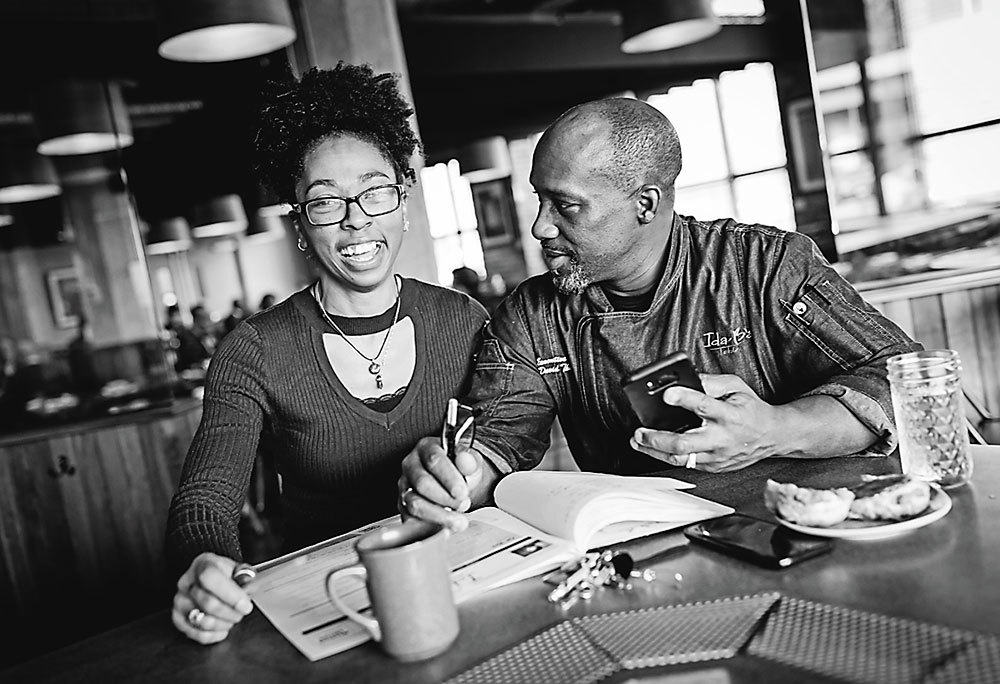
Chef Dave Thomas first came to cooking while working for an independent record company. “We brought this rapper by the name of Chubb Rock to Baltimore,” he recalls, “and part of his contract said he needed certain [foods]. I told them that I’d see if Tonya—who was my girlfriend at the time, and working as a caterer—could handle it. And she said that she could.”
Thomas was impressed by how much creativity went into Tonya’s cooking, and he was hooked. He went on to work for a caterer and eventually opened Herb & Soul, a restaurant in Parkville, in 2012. It was then that he became fascinated by soul food cuisine and, as the great grandson of a slave, the stories that it could tell.
In 2017, Dave and Tonya opened Ida B’s Table, the modern soul food spot where they worked until this spring. Now, they’ve moved beyond Ida B’s to juggle a number of new projects, from a cookbook proposal to a catering venture. We caught up with the husband-and-wife duo to talk about what’s next.
Last time we spoke, you shared that you were heading down South to do some filming with your good friend, writer and culinary historian Michael Twitty. How was your trip?
Dave Thomas: We just got back from Whitestone, Virginia. Michael is down there doing some content creation. He had a photographer and videographer and asked us to help with the cooking. We were on this property called Enon Hall, which is a former plantation right off the banks of the Rappahannock. Originally it was 600 acres, but they sold that off a long time ago. Now the family members, descendants of the original owners, own about seven acres. They refurbished the house and redid the slave kitchen that’s still existing on the property. We were cooking out of that kitchen—it was very rewarding.
What did you cook?
DT: We cooked for two days. We made beaten biscuits and yeast rolls, chicken and oysters—we steamed some crabs to make a Chesapeake gumbo. We made peanut stew, beef stew, and Carolina gold rice. We made waffles with an 18th-century waffle iron. We cooked on an open hearth. It was really like our ancestors cooked. We used pots that had been on the property and reacquired through estate and yard sales to bring back to the property.
“Most people don’t understand that Maryland is the South. It’s not the Deep South, but it is the South and there were a lot of enslaved people that came to this part of the country. There’s a lot of rich history here. I want to tap into that.” —Dave Thomas
That must have been incredibly moving.
DT: It was emotional. I got a chance to walk the grounds. I could feel the presence of my ancestors. We got there early and didn’t leave until after the sun had gone down. I felt more comfortable once it got dark. I just felt more of a calm at night than there was during the day, maybe it was the spirit of our ancestors giving us their blessing that we were recognizing the work and struggle that they had gone through. It was also interesting to be right on the banks of the Rappahannock River, which flows into the Chesapeake. There’s oysters and crabs and porgies—all of that stuff runs out of those waters. It was just amazing to be in touch with the agriculture of Maryland, Virginia, and the Chesapeake, and to be in touch with our ancestors all at the same time.
Last time we spoke, you mentioned that there was a cookbook in the works. Can you tell me more about that?
DT: We are just in the process. I signed with my literary agency, [New York-based] David Black, once I got back from a trip to Africa. Shortly after that, I signed a working agreement with my co-author, Osayi Endolyn, who is an incredible writer and has won a James Beard Award. We are developing the proposal right now. I’m focusing on soul food and how it pertains to the mid-Atlantic and Maryland. Maryland is right below the Mason-Dixon line, but most people don’t understand that Maryland is the South. It’s not the Deep South, but it is the South and there were a lot of enslaved people that came to this part of the country. There’s a lot of rich history here. I want to tap into that and make people aware of that, and create some recipes around that.
“Beaten biscuits are a Maryland thing. Maryland has its own fried chicken. Terrapin soup started here. Of course, there’s crab soup and oysters became more prevalent as a dish that would be presented on the table for those they cooked for.” —Tonya Thomas
What are some of those recipes that are distinctly from Maryland?
Tonya Thomas: Beaten biscuits are a Maryland thing. Maryland has its own fried chicken. Terrapin soup started here. Of course, there’s crab soup and oysters became more prevalent as a dish that would be presented on the table for those they cooked for. They were familiar with these foods and they knew what to do with them.
Why did the two of you decide to start a conversation series on Instagram Live?
DT: We have just met so many people in the industry, and certainly Ida B’s and Herb & Soul were catalysts for that. We wanted other people to hear their voices. We are not in this struggle alone in terms of reclaiming this narrative about our history and doing it through food. There are a lot of people around the country who are trying to talk about the struggle. We just wanted to have a place where we could bring those people in, have conversations with them, and have other people hear their stories. It’s really grown. We’ve gotten people like Michael Twitty and Howard Conyers, who is rocket scientist and a pitmaster. This week, we are talking about Black farmers.
With your winnings from Chopped in 2018, you recently traveled to Senegal and the Gambia with your family. What did you learn by going there?
DT: The biggest thing we learned is that the African people are more than resilient. They create these communities that work together. Every day we got up and were driving to a village or going to meet a chief at one of the villages. We went to Kunta Kinteh Island. We went to the National African Museum of Senegal. While we were there, we went to these outdoor markets. Once you get there, you see how well everyone works together. You find out how much this country has broken the spirit of Africa. It’s almost like we’ve been turned against each other and we are more concerned about what we have than who we have it with. That was really powerful to learn. We went to these villages and each one had a welcoming ceremony for us. There was one where we sat down with elders on this carpet and the main elder said, “Welcome home. We have been waiting for you.” And that just tore me up. These people have a sense of community. They work together and love each other and sacrifice for each other.
TT: A lot of us in this country have a big misconception of what Africa is like, until you get there. And not only that, but we had a misconception that they dislike African Americans—like, “You’re not from here.” That’s how we were told and what we were made to feel like, but it’s not the case. We were just family.
Are you thinking about opening another restaurant?
DT: I’m always thinking about my next restaurant. This is just one component of what we are doing. My business partners and I have started a company called Heirloom Food Group. The food group will have several different focuses. One is a high-end catering facility on Sinclair Lane in Northeast Baltimore. The second is a fast-casual concept. And the third is some type of catering tapas bar and restaurant. We’re also thinking about land. My partners and I have bought 10 acres of land and we are going to be growing on that land for all of our different properties and entities.
TT: Right now, the thing is learning how to pivot. We have these different concepts, but it will depend on how things are moving forward. We’re just trying to figure out what the dining experience is going to look like.
“The enslaved cooked what they had. They had no supermarkets to go to, so if you weren’t growing, catching, foraging, or hunting it, you weren’t eating it. I want people to know that we are far more than collard greens and fried chicken—that’s my purpose in life.” —Dave Thomas
Why do restaurants matter?
DT: Just from an employment aspect, restaurants employ a large swatch of the population in this country. For the Black and brown communities, they are one of the largest employers of our people, so they’re important for that aspect alone. On top of that you have restaurants that are really telling stories. You need people to be able to speak about who they are and bring their culture to the forefront—there’s no better way to do that than through food.
Would you go into hospitality again given the challenges?
DT: This is who we are. I love the business. I love and hate it at the same time. I love it because it gives me a way to express myself and it gives me a forum to speak about the things that are important to me. I hate it because it is a business and a business requires you to be focused on numbers. I’ve told everyone that Ida B’s was a social experiment as much as it was a business. What I was trying to do—and I really didn’t get my hands deep enough into it—is to show that soul food is not just fried chicken and macaroni and cheese.
Soul food is not a monolithic cuisine, much like it’s not a monolithic race of people who created it. Soul food is an extension of Southern food. Southern food is an extension of barbecue, creole, and Cajun. All of these things were created by the hands of the enslaved. The enslaved cooked what they had. They had no supermarkets to go to, so if you weren’t growing, catching, foraging, or hunting it, you weren’t eating it. I want people to know that we are far more than collard greens and fried chicken—that’s my purpose in life. There’s a lot more to this cuisine than those items that are stereotyped and put in the front. That’s the one thing that I regret about Ida B’s. I was not able to stretch out as much as I wanted to.
